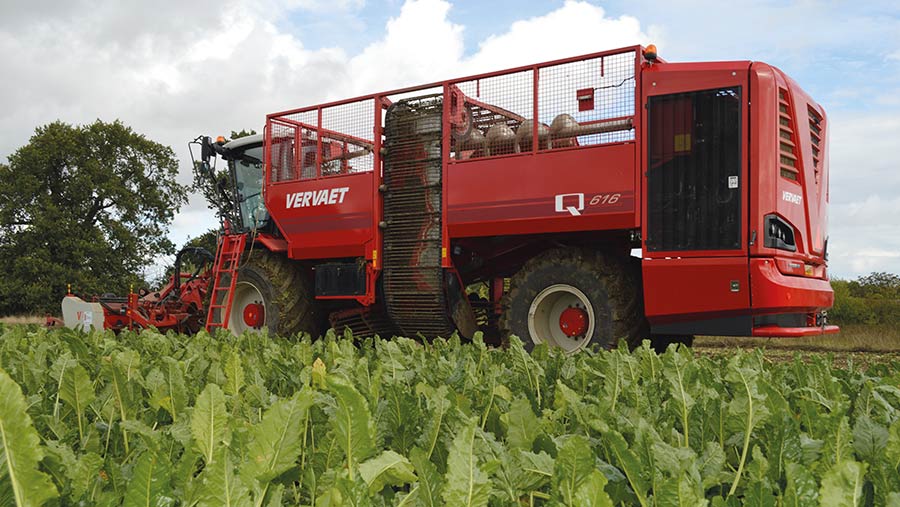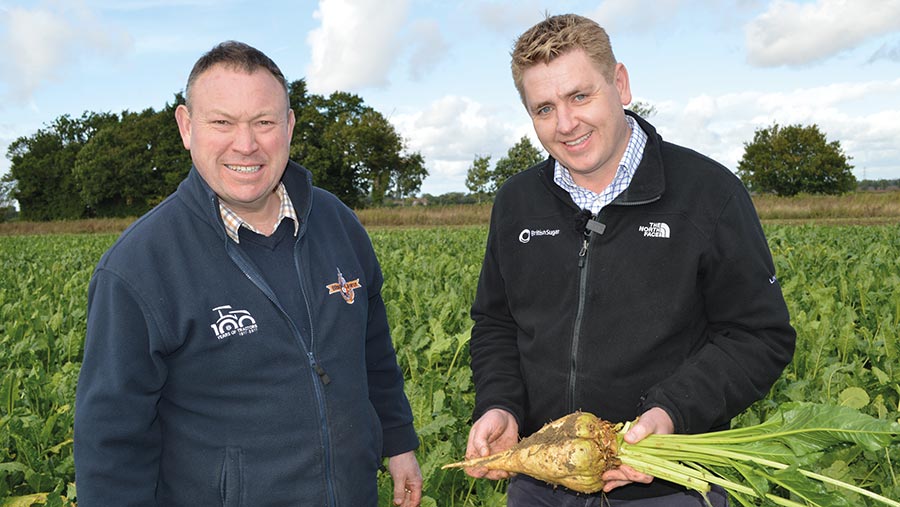Video: Good early sugar beet yields as harvesting speeds up
 © MAG/David Jones
© MAG/David Jones Sugar beet harvesting is kicking off with promising yields for one Suffolk farmer amid more optimism among growers due to low disease levels and a price rise in the pipeline.
James Forrest has had to cope with two previous very wet autumns when lifting sugar beet on his heavy land, but harvesting progress this season has been a lot easier.
His early beet lifts are showing yields of 70-80t/ha, in line with what he would expect from early-harvested crops, and coming out of the ground well after recent rain.
“This season’s beet looks a better crop with more potential than last year, and we are hoping to get autumn cereals in after lifting the beet,” he tells Farmers Weekly.
See also: Advice on clamping sugar beet for optimal harvest storage
Watch the video and read the rest of the report below.
Farm yields
Yields on his farm have averaged more than 90t/ha in the past few years, but last season, due to a very dry spring and virus yellows, yields dipped into the mid-70s in terms of tonnes a hectare.
Across the 200ha of sugar beet he grows, he has thankfully seen less evidence of the aphid-spread virus yellows disease this year.
Another positive for growers is that beet processor British Sugar has increased its beet price by as much as 33% for next year’s crop as the beet area this season has declined.
Mr Forrest started lifting beet on 14 September with his “new” reconditioned Vervaet six-row harvester, ahead of his local Bury St Edmunds beet factory opening two days later, and has been lifting most days since then.
Sugar contents are good for the time of year and above the Bury St Edmunds average in late September of 17%, which was encouraging as sugar levels tend to rise through the lifting season, with last year’s national average being 17.5%.
Blackgrass fight
Mr Forrest is one of 3,000-plus sugar beet farmers growing about 8m tonnes of beet, and this spring-drilled crop is key in his fight against blackgrass.
He farms 1,600ha of mainly heavy arable land, as RH Forrest & Co, at Mowness Hall, Stonham Aspall, just east of Stowmarket, growing a number of spring crops such as spring barley, beans and oats, maize, parsley as well as sugar beet.
“Sugar beet is important along with our other break crops as we are determined to keep on top of blackgrass,” he says.
UK sugar beet harvests |
|||
|
Year |
White sugar production |
Beet yields |
Beet area |
|
2019 |
1.19m tonnes |
80.65t/ha |
100,000ha |
|
2020 |
900,000t |
59.15t/ha |
103,000ha |
|
2021 |
More than 1m tonnes |
Above five-year average of 75t/ha |
91,000ha |
|
Note: Beet yields are given on a zero-crown basis. The five-year average national beet yield is 75t/ha. The record crop of 1.45m tonnes of white sugar was harvested in 2014. White sugar production and beet yields for 2021 are current British Sugar forecasts |
|||
Mr Forrest has invested heavily in the crop in recent years, with a 12-row Vaderstad Tempo drill that can apply liquid fertiliser, an inter-row hoe for use in sugar beet and parsley crops, a chaser wagon to take beet from the field to large trailers or trucks, and the beet harvester.
This year’s crop was drilled into good seed-beds in the spring, and despite the cold, dry spring, grew better than in the past two years, with rain showers through the summer helping the crop to put on weight.
He hopes to cultivate the land with a disc-tine TopDown cultivator, press and then drill winter cereals after the sugar beet.
Factory openings
His local sugar beet factory at Bury St Edmunds was the first to open, with Newark in Nottinghamshire and Wissington in west Norfolk opening in late September, and Cantley, in east Norfolk, due to open on 12 October.
Nick Morris, head of central agriculture at British Sugar, says the group’s early root digs suggest national yields will be slightly higher than the five-year average of 75t/ha on the zero-crown basis.

Sugar beet grower James Forrest (left) and Nick Morris from British Sugar © MAG/David Jones
“After a cold April at establishment time, the crop’s growth accelerated in late May and into June with increased warmth and rain,” he says.
Early lifting does entail a yield penalty as crops can increase yields by up to 50% from the start of the beet harvesting campaign in mid-September up to Christmas, but many heavy land growers have to prioritise early lifting.
Virus yellows
Mr Morris points out that virus yellows was seen in all of the group’s four factory areas last year, but the worst-affected region was in the Wissington factory area, due in part to aphids overwintered on other crops, such as brassicas.
“For 2021, virus yellows levels in term of infections have been negligible largely due to very cold temperatures in January and February,” he adds.
Virus yellows is spread by the peach-potato aphid, which in the past had been controlled by neonicotinoid insecticide seed dressing.
However, these were banned because of concerns that they may kill bees and other pollinators, and this is the third season that sugar beet growers have been without these dressings, and they have had to rely on foliar insecticides to try to control the aphids.
After a difficult year for growing sugar beet in 2020 due to unfavourable weather and virus yellows infections, the beet area for 2021 fell nearly 12% to 91,000ha, and below the 95,000-100,000ha of crop that British Sugar sees as sustainable going forward.
Beet pricing
British Sugar announced in late September that its one-year contract fixed-price/adjusted tonne would rise 33% to £27/t from £20.30/t previously, and multi-year contracted growers would have the option to upgrade by 18% to £25/t from £21.18/t by extending their contracts.
With volatile sugar price, the group found it more difficult to commit to higher fixed prices too far into the future, hence the better price for a one-year contract, but these one-year contracts could go up or down in future seasons.
Many growers have given a cautious welcome to these price rises after a tough couple of years financially growing sugar beet.
“It is an improvement, and we hope there is more to do to encourage loyal growers,” says Mr Forrest.
Although the sugar market is volatile, firmer world sugar prices recently have allowed the group to increase prices.
“The sugar market has improved this year and we are delighted to be able to share that value with growers,” says Mr Morris.

